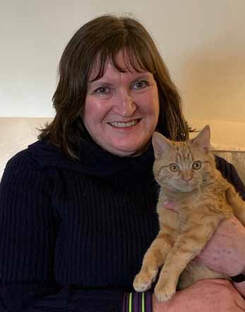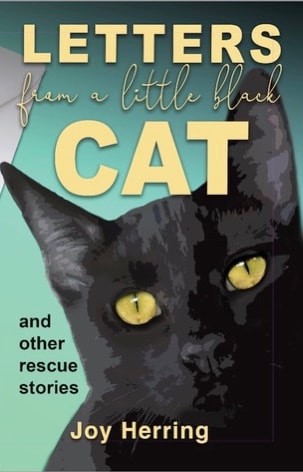 Joy Herring: "Cats should never be
Joy Herring: "Cats should never bein charge in a household."
By Geoff Ellis
REHOMING cats is a numbers game. Kittens can become mothers from four months old, then have as many as four litters a year. In 2005, when Joy Herring and her daughter Caroline became kitten foster carers for the RPSCA, pounds and shelters operated under the 28-day rule - they had four weeks to find a forever home.
Those all too short weeks covered quarantine, bringing the condition of the cat up to standard and finding a new owner. If they didn’t, cats and kittens were treated like vermin. Thousands of kittens, pregnant cats and mothers nursing babies were routinely euthanised.
Joy and Caroline were handed many sets of kittens to take home to get them up to the 750 grams they needed to be before they could be desexed. One ginger kitten was borderline in reaching the required weight. An anticipated reprieve didn’t eventuate and the kitten they had loved and cared for was euthanised. They were devastated.
REHOMING cats is a numbers game. Kittens can become mothers from four months old, then have as many as four litters a year. In 2005, when Joy Herring and her daughter Caroline became kitten foster carers for the RPSCA, pounds and shelters operated under the 28-day rule - they had four weeks to find a forever home.
Those all too short weeks covered quarantine, bringing the condition of the cat up to standard and finding a new owner. If they didn’t, cats and kittens were treated like vermin. Thousands of kittens, pregnant cats and mothers nursing babies were routinely euthanised.
Joy and Caroline were handed many sets of kittens to take home to get them up to the 750 grams they needed to be before they could be desexed. One ginger kitten was borderline in reaching the required weight. An anticipated reprieve didn’t eventuate and the kitten they had loved and cared for was euthanised. They were devastated.
"Back then it was so routine to euthanise young cats that the vet probably didn’t even give it a thought that it was our foster kitten," Joy reflects.
This is one of the stories Joy tells in Letters from a Little Black Cat, her account of the joys, heartbreak and laughter of caring for rescue cats.
This is one of the stories Joy tells in Letters from a Little Black Cat, her account of the joys, heartbreak and laughter of caring for rescue cats.
| Letters from a Little Black Cat by Joy Herring, with cover art by Trish Hart, was launched at La Provincia in Corinella last month. It’s on sale at Macca’s Farm, Bassine Dairy and ArtSpace Wonthaggi. You can also order online. | The book is written from a rescuer’s perspective but her aim was to entertain as well as educate. She says that cats need to be treated right. They love routine. "Cats should never be in charge in a household. So instil a routine and stick to it," she advises. “Cats make awfully bad masters.” She hopes to engage a readership from children through to grandparents, while teaching empathy and respect for cats. Small children should always be supervised around cats. A screaming toddler will turn a friendly cat into a scaredy cat and one that will probably want to escape. But back to her early days as a cat rescuer. "RSPCA vets spent most of their time killing animals," Joy reflects. No wonder there was a high turnover of vets at the RSPCA. To this day, vets are over-represented in suicide statistics. The shelter manager had approved the decision to euthanise those kittens so Joy wrote to the head of the RSPCA. She never received a reply. She quit and began collaborating directly with the Mornington pound. |
That’s when her work really started. Joy would go to the Mornington market on a Wednesday to set up a pen with kittens needing to be rehomed. To start with, she and her husband paid for them to be desexed, microchipped and vaccinated. She would try to convince people to take one of her vet-worked kittens instead of the many “free to good home” ones readily available.
In 2010 Joy formed Peninsula Cat Rescue. “I knew that if we were to be taken seriously we needed to be professional. I was sick of all the pussy jokes.” A campaign by a coalition of welfare groups under the title of “Stop the Clock” managed to get the 28-day rule revoked and things began to improve.
The growth of social media also tipped the odds in favour of cats. “The advent of the internet, and all those nerdy people on their computers who loved cats, was the biggest change. Suddenly, all the cat lovers came out of the woodwork and the internet was flooded with cat videos.”
Joy tapped into that flood with a Facebook page the public loved. Thousands of cats and kittens have since found homes, via various sites.
Many sites educate the public about responsible pet ownership which includes feeding and containment as well as desexing. Cats are obligate carnivores, that is they need to eat meat. Their natural diet is mice and rats. If they aren’t given meat in their diet, they will search it out and any small mammal or bird is at risk.
Joy says they should also be kept inside at night as that is when most cats will kill wildlife. "If room permits, build a cat enclosure to keep them and wildlife safe, or keep them inside. Cats make great pets but need to be treated with respect."
In 2010 Joy formed Peninsula Cat Rescue. “I knew that if we were to be taken seriously we needed to be professional. I was sick of all the pussy jokes.” A campaign by a coalition of welfare groups under the title of “Stop the Clock” managed to get the 28-day rule revoked and things began to improve.
The growth of social media also tipped the odds in favour of cats. “The advent of the internet, and all those nerdy people on their computers who loved cats, was the biggest change. Suddenly, all the cat lovers came out of the woodwork and the internet was flooded with cat videos.”
Joy tapped into that flood with a Facebook page the public loved. Thousands of cats and kittens have since found homes, via various sites.
Many sites educate the public about responsible pet ownership which includes feeding and containment as well as desexing. Cats are obligate carnivores, that is they need to eat meat. Their natural diet is mice and rats. If they aren’t given meat in their diet, they will search it out and any small mammal or bird is at risk.
Joy says they should also be kept inside at night as that is when most cats will kill wildlife. "If room permits, build a cat enclosure to keep them and wildlife safe, or keep them inside. Cats make great pets but need to be treated with respect."
